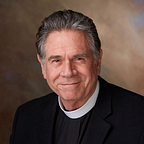If Archbishop Thomas Cranmer was alive today…
He’d have an iPhone, an iPad, and he’d live stream services to social media.
He wrote the first Book of Common Prayer in 1549. Then published a new version in 1552. It was never his intention to drag his original liturgies through the centuries unchanged, unmodified, unclear. He may have lived in the mid 1500s, but he was definitely a radical. Rather than rejecting new technology, he embraced it. The invention of the printing press changed everything.
“Johannes Gutenberg’s printing press made it possible to manufacture large numbers of books for relatively little cost for the first time. Books and other printed matter consequently became available to a wide general audience, greatly contributing to the spread of literacy and education in Europe.”
Britannica.com
The printing press opened the possibility of getting the scriptures and the liturgy into the hands of ALL the people, not just the clergy.
Now, 500 years later, the church is caught in another paradigm shift. Books gather dust. Screen time accelerates. The church, in it’s passion to preserve tradition, declares the internet is of the devil, and rejects all it offers. But they are wrong.
The Internet is not a product of evil. It’s how God responded to faithful people crying out for help.
Ten years ago, I led an Adult Forum on the rapid advance of technology and social media. (That data is now obsolete). After the presentation, a retired NASA worker said, “I can’t believe how this technology has grown. You know, I’m an Internet pioneer.”
I was immediately suspect, but looked him in the eye, and I sensed it was true.
He worked at the General Dynamics Electric Boat in Connecticut building nuclear submarines. Different suppliers provided different systems for the boats: navigation, propulsion, weapons, etc. They were having problems interfacing the different systems together because suppliers used different computer platforms to design their products. He was one of three people tasked with finding a solution. Facing the impossible, they gathered for an hour before work each day and prayed that God would reveal a method to accomplish the task for his purposes. After months of hard work and prayer, the first file transfer protocols were created and files were shares over unlike platforms. When word got back to the pentagon, they wanted the see the files too. So they sent the data over a telephone line.
Most people don’t realize that the internet was created on a foundation of prayer.
Just as 16th century believers had the opportunity to advance God’s word through the printing press, the faithful in the 21st century are called to advance God’s word through technology.
